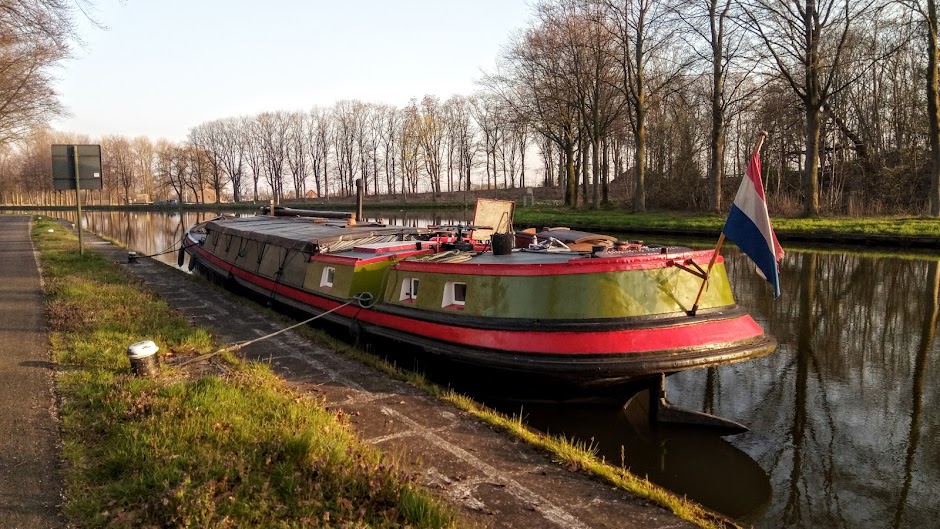With my research for my next book and also as background to The Skipper's Child, I've been looking at old photos of the Fernhout family's barge, and with Koos's permission, I thought it would be nice to share some more of these with you here. All the pictures below are from a small collection Koos has kept since he was a youngster and has now scanned in the hopes of preserving them further. The originals are becoming very faded and so this is one way of keeping these precious images for family posterity.
Many of them were taken before Koos was born and show his father's barge at various times before and after World War II, so they are especially interesting to me as they show its development over the years.
 |
You can see the side propellor in this picture of the loaded Twee Gebroeders in 1955 after the main engine was fitted. Apparently Hendrikus Fernhout kept the system as an auxiliary motor for when the current was very strong, for instance when they were on the Rhine. Notice Papa Fernhout is in a white shirt and tie. Apparently this was normal Sunday wear and Sunday was usually photo day!
I love this one. It's almost like an aerial shot, but it was taken from the rocks high above the Maas at Namêche, in Belgium (I told you Belgium was beautiful!)
And here, the lovely old fashioned bows where two of the Fernhout children are standing. This one and the one below are on the Maas, again in Belgium. Koos was the youngest of four children who survived. Two others were tragically lost to drowning when they were very small as often happened in skippers' families. The awful sadness of losing those two babies could well have affected Mrs Fernhout deeply, making her more withdrawn than even her very real deafness would have done.
A wonderful image of the deeply laden Twee Gebroeders in Stevensweert in Limburg, in the south of the Netherlands. I don't have a date for this photo, but according to Koos, it is probably pre-war.
This one and the last photo below show the new conformation with the wheelhouse right at the stern and the engine's chimney just in front of the roef or saloon. Such developments were normal in the course of a barge's life in the 20th century, something that makes it difficult for restorers to deal with when deciding on how far to take their restoration.
I'll be looking back to the period of these photos over the next months because I'm also really looking forward to writing my story about the father of my Skipper's Child, which will be set during the WWII. Photos like these give me the inspiration, but of course now I need information too, so it'll mean hours of reading (mostly in Dutch, so that'll take me even longer!) and heaps questions that I'll have to put to people in the know. A happy thought and a special project to take me into the next
And here, the lovely old fashioned bows where two of the Fernhout children are standing. This one and the one below are on the Maas, again in Belgium. Koos was the youngest of four children who survived. Two others were tragically lost to drowning when they were very small as often happened in skippers' families. The awful sadness of losing those two babies could well have affected Mrs Fernhout deeply, making her more withdrawn than even her very real deafness would have done.
I'll be looking back to the period of these photos over the next months because I'm also really looking forward to writing my story about the father of my Skipper's Child, which will be set during the WWII. Photos like these give me the inspiration, but of course now I need information too, so it'll mean hours of reading (mostly in Dutch, so that'll take me even longer!) and heaps questions that I'll have to put to people in the know. A happy thought and a special project to take me into the next
And if you are interested in reading The Skipper's Child, why not take a look the first few pages on Amazon:
http://www.amazon.co.uk/Skippers-Child-Valerie-Poore-ebook/dp/B007U79URK/ref=sr_1_6?s=digital-text&ie=UTF8&qid=1452444298&sr=1-6&keywords=valerie+poore
HAPPY NEW YEAR ALLEMAAL




















